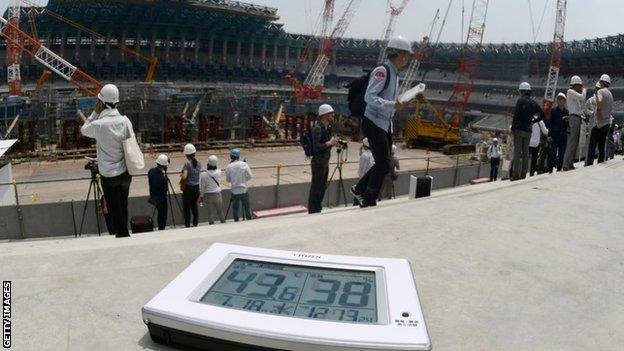Tokyo 2020: Japan's heat will impair Olympic athletes' performance, says report
- Published

A thermometer shows the temperature at over 40 degrees during a July 2018 media tour at the Japan National Stadium
The impact of climate change will likely lead to "impaired" performances at the Tokyo Olympics, according to a report backed by leading athletes.
In the report, titled Rings of Fire, it is argued that summer heatwaves in Tokyo during the past three years indicate that conditions will be tough.
Concerns over heat have caused the marathon to be moved from Tokyo., external
Professor Mike Tipton said he expects Tokyo to be the most "thermally stressful Olympics" of recent times.
The University of Portsmouth professor helped to produce the report, which was backed by athletes, the British Association for Sustainability in Sport (Basis) and scientists from the Priestley International Centre for Climate at Leeds University.
He told BBC Sport: "The take-home message is you've probably got to move the Olympics to a different time of the year rather than a different geographical location or time of the day and I think that's something, going forward, the International Olympic Committee will have to start considering.
"I would be fairly confident to say that performances will be impaired across a lot of sports. The sport as a spectacle will be impaired in terms of the performance level of the people who are doing it."
Mara Yamauchi, who competed in the marathon for Britain at the 2008 and 2012 Olympics, backed the report.
She said: "We risk potentially far-reaching consequences for sport as we know it if climate change continues apace.
"We can all do our bit, even in a small way, to mitigate the effects of climate change, and conserve sport and the Olympics in viable forms for future generations."
The Tokyo Games - moved from 2020 because of the Covid-19 pandemic - are scheduled to run from 23 July to 8 August.
According to the Rings of Fire study, there are concerns about climate In the run-up to the event.
It says the mean annual temperature in the region has risen by 2.86 degrees since 1900 - three times as fast as the world average.
In 2018, a July heatwave was called a natural disaster by Japan's weather agency, while in 2019 more than 5,000 people were hospitalised in around a week because of conditions.
In the study, British triathlete Alistair Brownlee details the dangers of competing in hot conditions.
The 33-year-old says he recalls competing in an event in London in 2010 but cannot remember anything between being 300m from the finish and ending up on an intensive care ward.
In addition, the report highlights that at the 2019 World Athletics Championships in Doha, 28 of the 68 starters in the women's marathon failed to finish because of heat and humidity.
British rower Melissa Wilson added: "We know there'll be muscular and heart impacts of the high heat and so there's that physical impact and we'll see that in terms of the times that athletes go on to achieve.
"If we want to see records, the chances of that will be limited by these intense environmental conditions.
"But also the experience of the athletes trying to deliver your best rowing when somebody has put you in a frying pan is really not pleasant."
Along with the marathon being moved to Sapporo, organisers have looked at other options such as cooling mist machines and surfacing roads along the route with a heat-reducing reflective material.